67th "Warsaw Autumn"
Permeations
The theme of this year’s Warsaw Autumn is the permeation into contemporary music of historical musical languages and sound phenomena belonging to various contemporary genres. Someone will say that this is too much for one festival. They would be right. The more so because we present this process continuously, at every Warsaw Autumn. However, we have chosen it as our main theme for the first time.
Sounds that are old, out of the mainstream, or “dangerously” popular, can be transformed into a sophisticated material of contemporary art. To put it in more detail: at Warsaw Autumn, we are witnessing a journey of musical signs and sound aggregates from classical music, early music, traditional music, jazz, improvisation, club music, song, avant-pop and new dance music to the large and complex sound field of contemporary music, which tends to expand at the speed of sound at the very least. This field, also due to this process of trans-genre and trans-historical osmosis, is seemingly losing its distinctiveness and is becoming increasingly difficult to describe. Nonetheless, it is still defined by a strong cognitive motivation of authors and audiences, cultural competence and reference, a structural and coherent trait, to mention only the most important features of this territory.
We certainly do not broach the subject of permeation because we are sentimental about what has happened before or because we succumb to the allure of phenomena from our lighter modern artistic neighbourhoods. We do not think that the best is behind us and that we can only succumb to a longing for a musical paradise lost. We do not indulge in the tempting musical stimulants of pop culture or the soft field between conventions
At Warsaw Autumn, we show the musical state of things as a dynamic process, an overlapping of phenomena, a map of shape-shifting fronts, as opposed to the static, monadic, ceremonial notions of some linguistic idioms and the exclusion of others. Let us delight in this dynamism, for there is so much life, colour, emotion, and structural order in it. I will perhaps extinguish the ecumenic spirit when adding that openness to the richness is one thing, but structure, consistency and coherence or even radicalism in using the above-mentioned criteria is another—the latter is necessary for the Festival to have its own character.
Permeation is also transmediality: coming from the internet, from the visual arts, from cinema and new technologies. It is also the flow of ideas—trying to explain reality—and even politics.
In programming Warsaw Autumn, we have never locked ourselves in an ivory tower of aestheticism. We did not adhere to the safe view that art is apolitical, although we were aware that it is often not explicitly political. We have tackled subjects that were difficult and ran the risk of arousing resentment, in the belief that Warsaw Autumn is meant to show what troubles artists. They have repeatedly shown their sensitivity to human rights and cultural standards; to what societies here and in many other parts of the world are facing. Reflections of the times also resonate in this year’s programme; discourse is always better than silence. Without, however, exaggerated one-sidedness: full-blooded music is a multidimensional art and cannot be reduced to a single aspect.
The flow of ideas is fostered by the presence at Warsaw Autumn of composers from twenty-four countries: mostly from Poland, Ukraine and the United Kingdom, although nationality is one thing, and conscious cultural and residency choices are another. Since Warsaw Autumn is also international in name, it is worth highlighting this circumstance.
With such an issue, it will come as no surprise that this Warsaw Autumn will bring together artists and ensembles not often hosted together at the same festival.
These will notably include the Polish National Radio Symphony Orchestra in Katowice conducted by Yaroslav Shemet, with soloists Mariam Rezaei (turntables), Łukasz Długosz (flute) and Rei Nakamura (piano); the Warsaw Philharmonic Orchestra conducted by Geoffrey Paterson; the Basel Sinfonietta conducted by Titus Engel; the European Workshop for Contemporary Music conducted by Rüdiger Bohn with Piotr Sałajczyk (piano) as soloist; Orkest De Ereprijs conducted by Gregory Charette with Konstantin Napolov (percussion) as soloist; Chopin University Big Band conducted by Piotr Kostrzewa; Random Check Ensemble; Spółdzielnia Muzyczna contemporary ensemble; Black Page Orchestra; Hańba! Band; {oh!} Orkiestra conducted by Martyna Pastuszka; the Simultaneo ensemble conducted by Karol Kisiel with Maria Pomianowska (Płock fiddle, Biłgoraj suka); proMODERN conducted by Andrzej Borzym; Tomek Szczepaniak (percussion instruments); sound artists such as FOQL, Rafał Ryterski, H31R, the Brandhi Persico duo, LOUFR, and Authentically Plastic.
This year’s Warsaw Autumn features nearly seventy events with concerts, performances, meetings, and workshops. Add to this a dozen diverse accompanying initiatives. Sixty-five works will be performed as part of the main Festival stream, including thirty-nine world premieres, making this edition of Warsaw Autumn exceptionally active in animating creativity.
What lies ahead?
– The inaugural concert, performed by the National Polish Radio Symphony Orchestra in Katowice and conducted by Yaroslav Shemet, with inspirations including folk tradition, Baroque, Classicism, audiovisuality, and hip-hop. The programme includes three world premieres: Geh bis an deiner Sehnsucht Rand by Helena Tulve for Płock fiddle, Biłgoraj suka and vocal octet; it’s fine, isn’t it? by Paweł Szymański for flute and symphony orchestra; and Fire by Żaneta Rydzewska for symphony orchestra.
– A percussion recital by Tomek Szczepaniak with new works by Raphaël Cendo, Anna Arkushyna, Xavier Bonfill, and Viacheslav Kyrylov for percussion, with electronics in three cases.
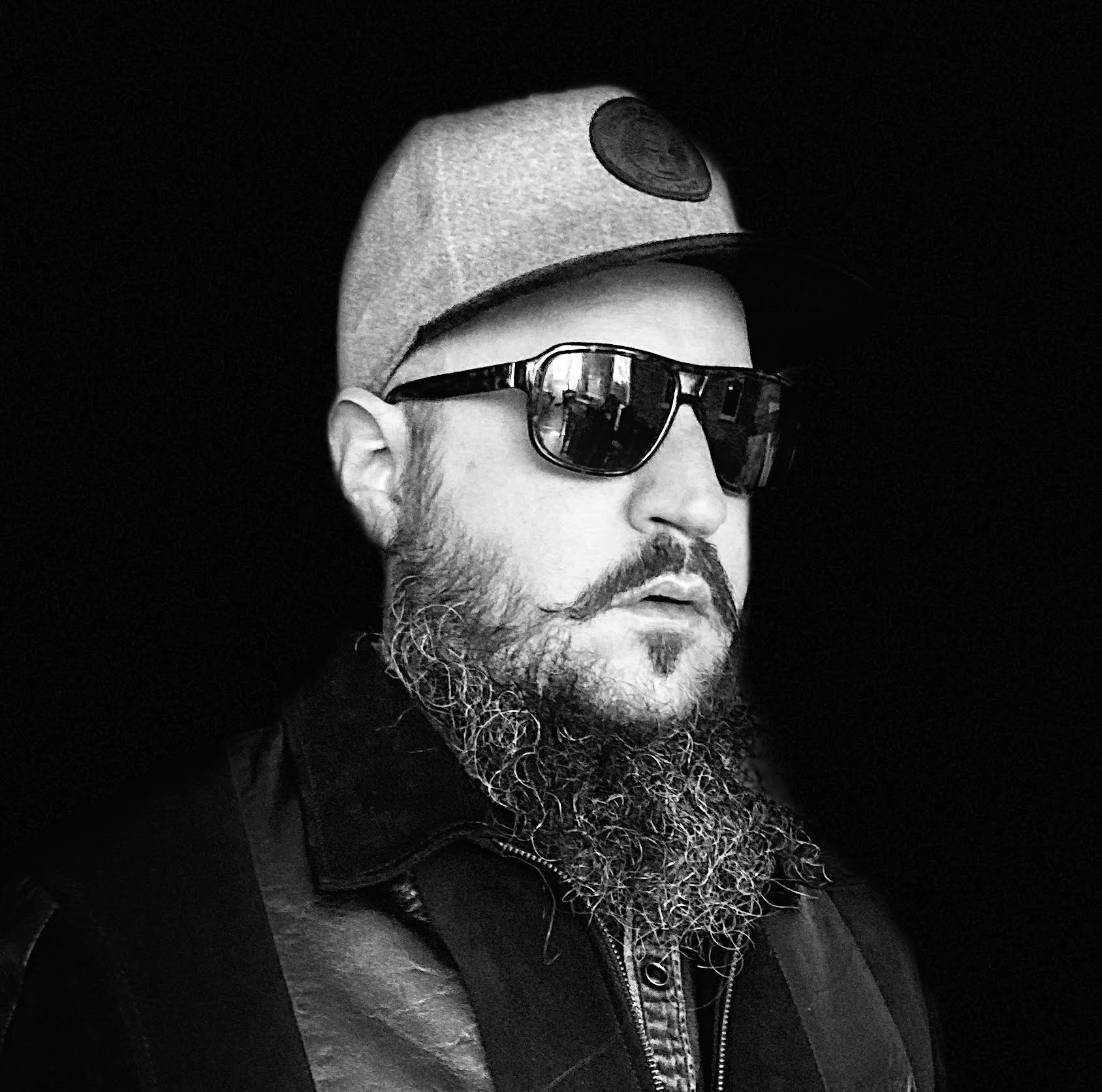 Raphaël Cendo
Raphaël Cendo
– The presentation of a new version of the intermedia project Random Check, curated by Marcin Rupociński. We invite you to this event at the Polish Creative Industries Development Centre, where the Festival returns after a long break.
– Them and Us? is the idea behind a concert of the Basel Sinfonietta conducted by Titus Engel. The event will feature the world premieres of Yurii Pikush’s Domi Res Militaris, Aleksandra Słyż’s Suspended in Ratios, Sergej Newski’s Göttin der Geschichte, and Stefan Keller’s Ein sicherer Hafen. We worked with our Swiss partners on this concert for more than two years. The importance of this event lies in the integration of sociopolitical issues among the ideas of the concert, the question of the sense of being conscious and ethical towards history also in art, in reaction to Putin’s aggression towards Ukraine and the world of democratic and humanist values. We are brought to such an artistic encounter in the conviction that a common front, both civilisational and cultural, is necessary in the face of the war in Ukraine.
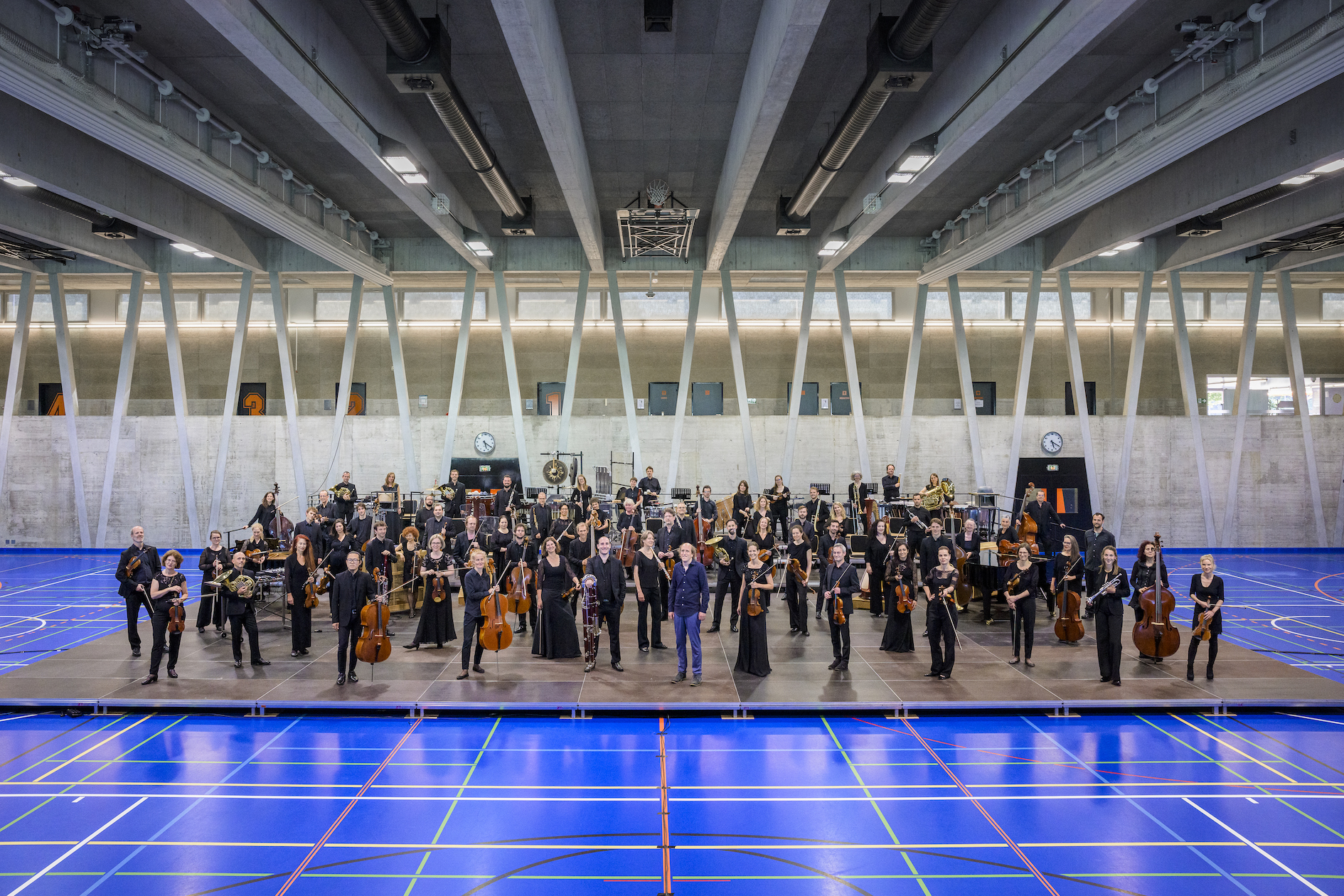
Basel Sinfonietta, Titus Engel, photo by Marc Doradzillo
– For the twenty-first time, the European Workshop for Contemporary Music, an orchestra made up of students of various nationalities affiliated with Polish and German universities, will be performing at Warsaw Autumn, as always under the direction of Rüdiger Bohn, with Piotr Sałajczyk as soloist. This concert will notably feature the world premiere of a work by Magdalena Gorwa.
– Performative actions by the Dutch group BUI, an ensemble specialising in actions in public space.
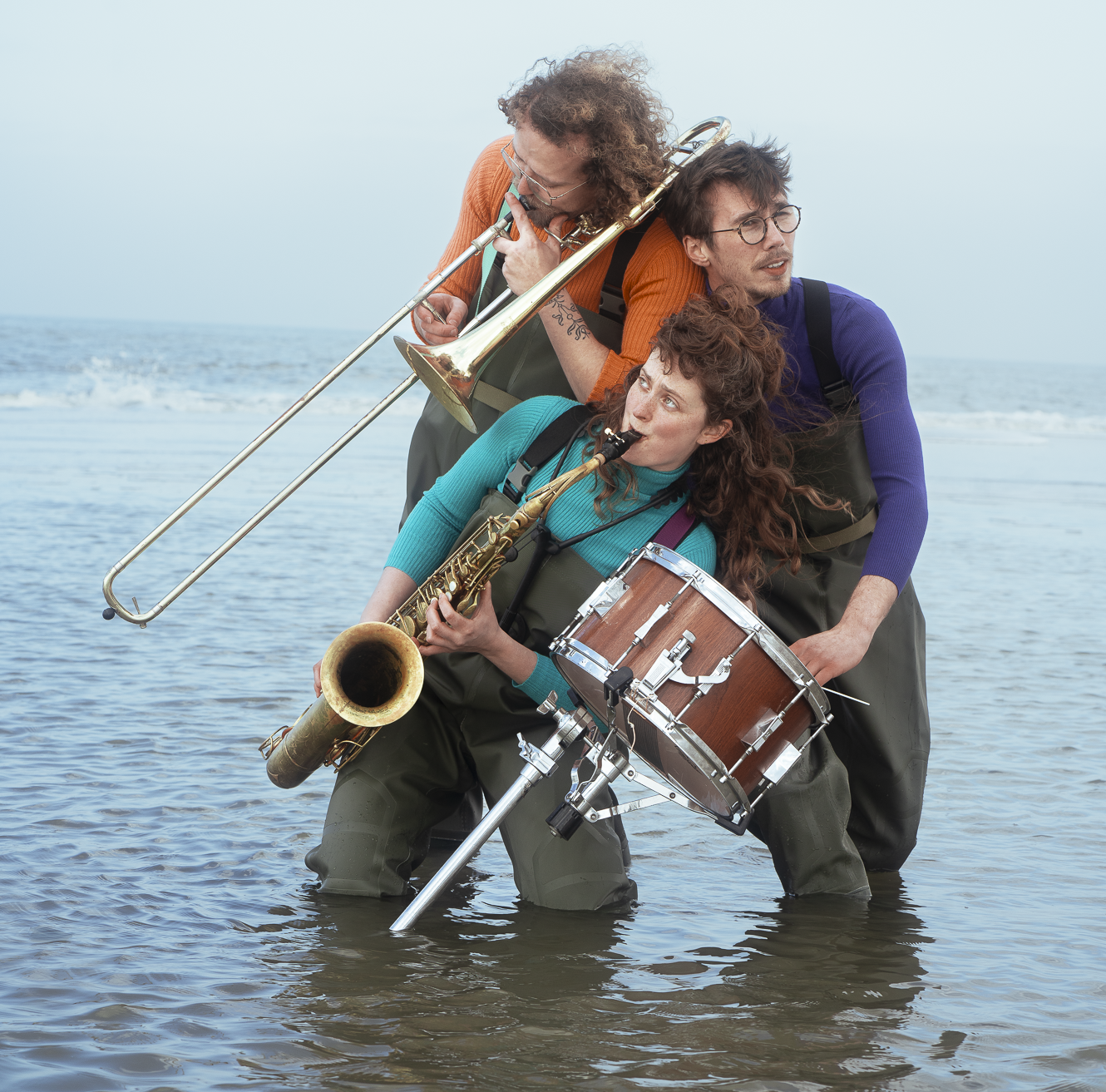
BUI, photo by Anna Perger
– The Black Page Orchestra, one of the most daring ensembles of today’s music scene, returns to Warsaw Autumn, bearing witness to the work of equally daring artists of the younger and middle generations. Alongside other works, the ensemble will present the world premiere of Blood did not seep into the ground by Idin Samimi Mofakham.
– The premiere of ten songs to texts by Grzegorz Uzdański, composed by Katarzyna Dziewiątkowska, Anna Ignatowicz-Glińska, Krzysztof Knittel, Jerzy Kornowicz, Katarzyna Krzewińska, Paweł Malinowski, Anna Sowa, Monika Szpyrka, Artur Zagajewski (curator of the event), and Rafał Zapała. Songs will be performed by the rebellious backyard orchestra Hańba!, known for its punk rock, folk, and klezmer repertoire.
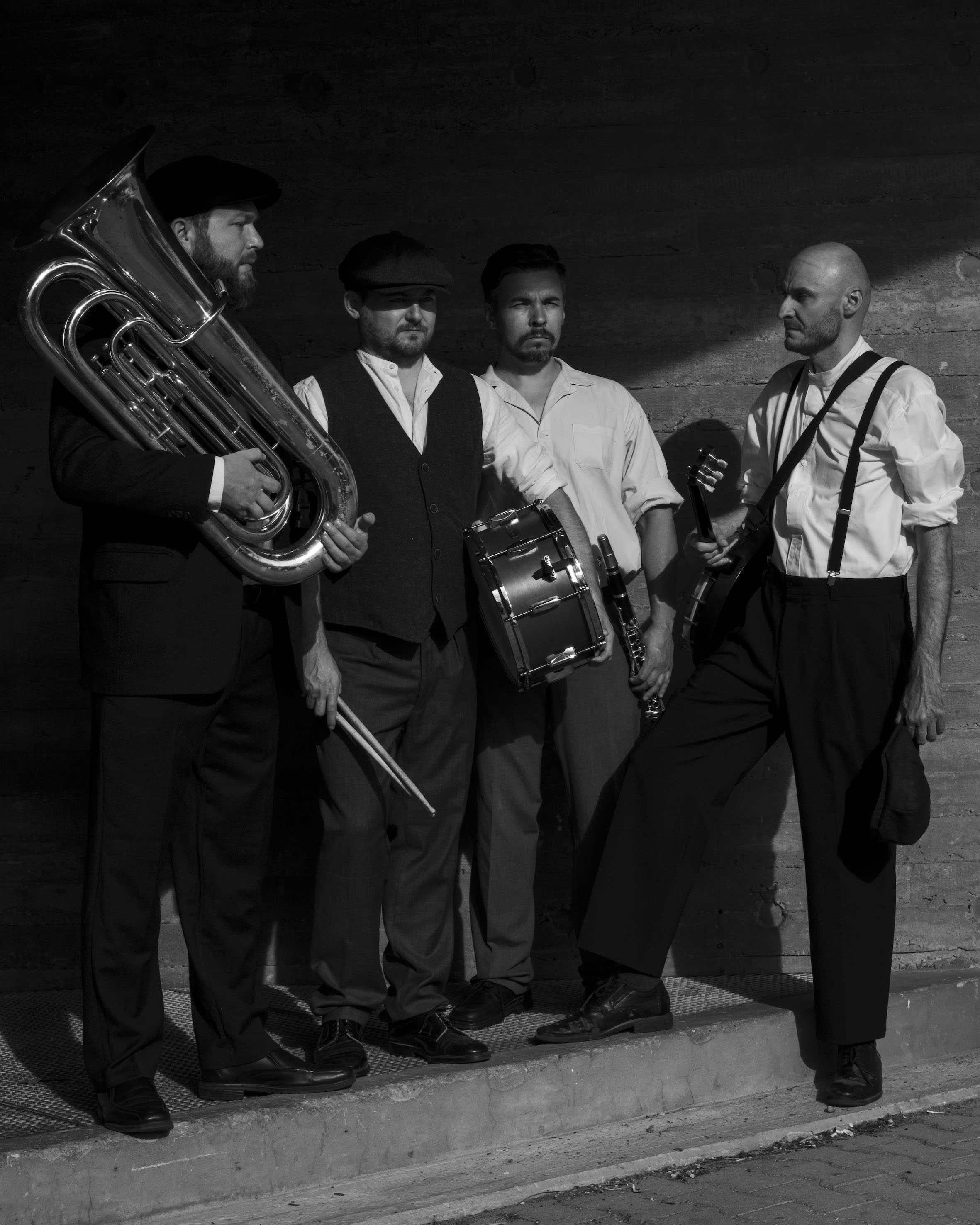
Hańba!, photo by Karol Gryoruk
– The Orkest De Ereprijs concert programme includes the world premiere of a work by Mateusz Ryczek and a Polish premier of Moritz Eggert’s Master and Servant. De Ereprijs has had great merit in promoting Polish music since the early 1990s. In fact, the Polish repertoire of this ensemble is quite representative of the last three creative decades in Poland. The ensemble has been a guest at Warsaw Autumn several times, but not since 2010. This provided a pretext for a cross-sectional presentation of De Ereprijs, in the formula of a marathon with a strongly international and aesthetically diverse content. For the first time, the ensemble will play in Warsaw without its founder and conductor Wim Boerman, to whom we send our warmest regards.
– A concert by one of the most recognisable early music ensembles, the {oh!} Orkiestra. Curated by Krzysztof Wołek, the concert shall feature premieres of works by Yu Kuwubara, Olgierd Juzal-Deprati, Aleksandra Gryka, Krzysztof Baculewski, Dmitry Lybin, and Mateusz Śmigasiewicz. Period instruments bring new sounds and an opportunity to play with the past, transforming its characteristic motifs. This is another spectacular event of this year’s Warsaw Autumn, following in the footsteps of historical permeation.
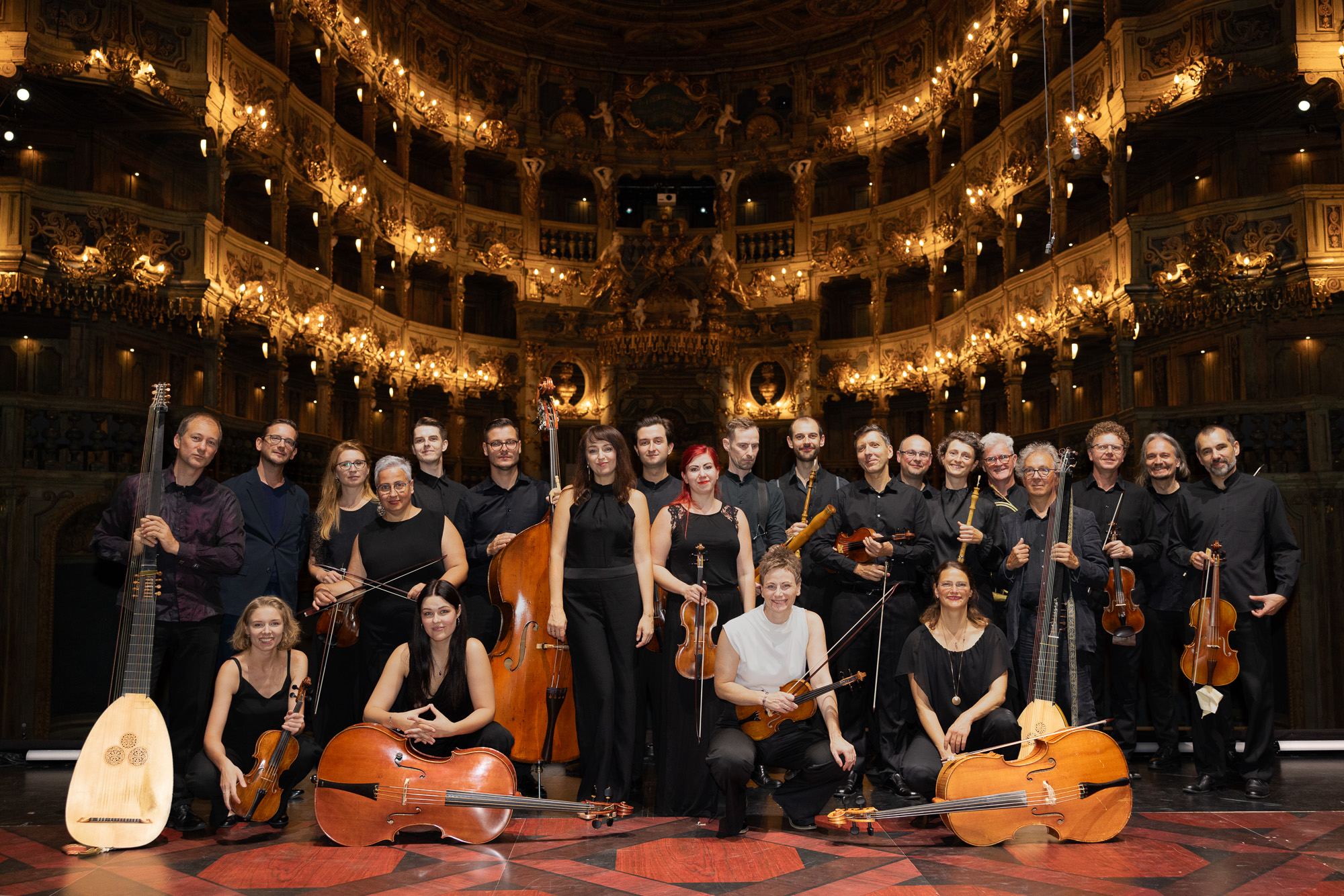
{oh!} Orkiestra, photo by Clemens Manser
– Pianist Rei Nakamura’s performance of Wojtek Blecharz’s Concerto for Piano and Wireless Speakers. This piece opens the listener to space and the shared experience of being in sound with others.
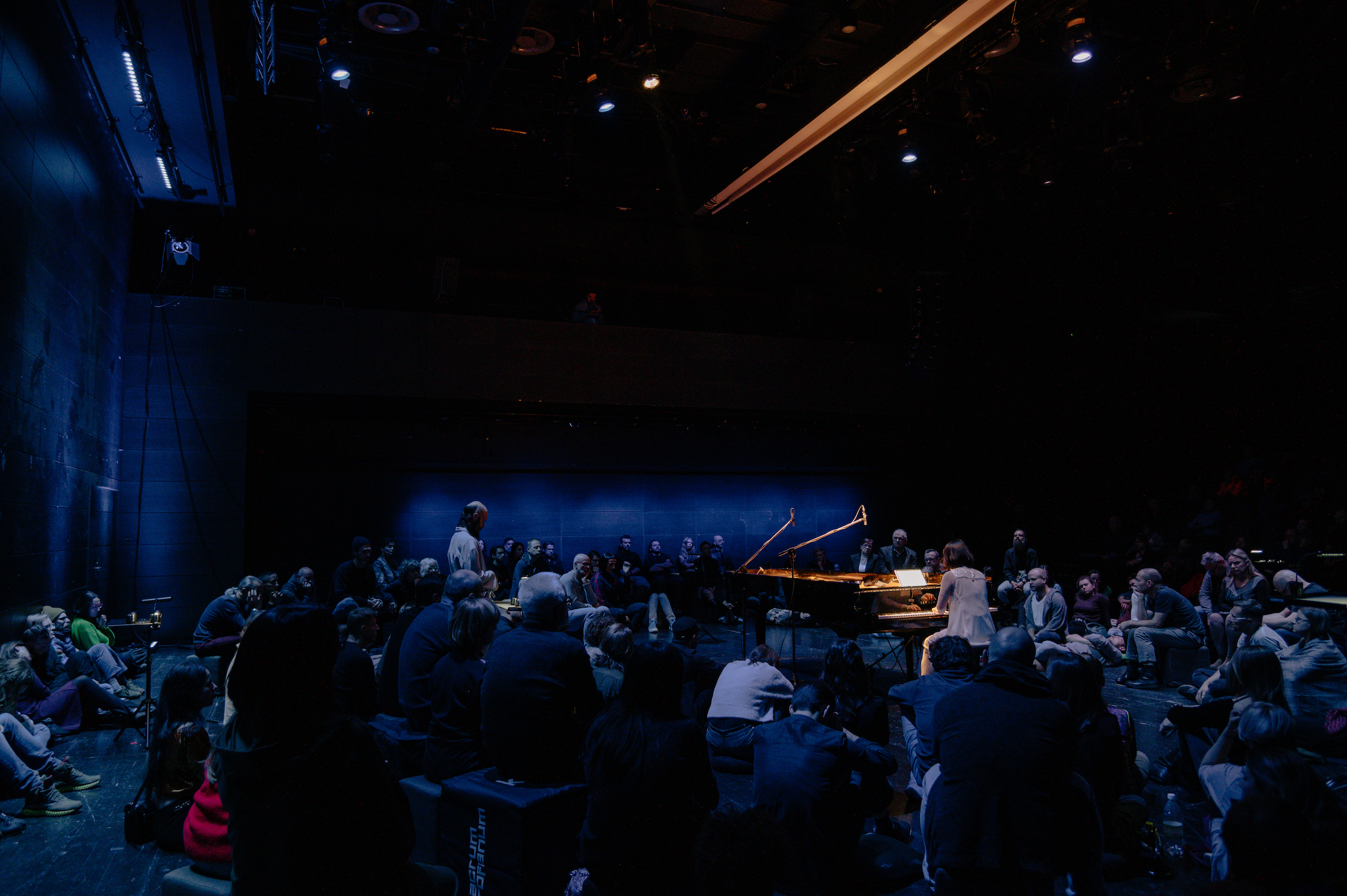
Wojtek Blecharz, Rei Nakamura, photo by Klaudia Krupa
– Dance Modern shall present six improvised sets created especially for Warsaw Autumn. With music to listen to, but also... dance to. This explores the permeation between yet another avant-pop idiom and the artistry inherent in contemporary music. Dance Modern’s will be presented by FOQL (Justyna Banaszczyk), Rafał Ryterski (event curator), H31R, the Brandhi Persico Duo, LOUFR (Piotr Bednarczyk), and Authentically Plastic.
– At this year’s final concert, we shall present notably Simon Steen-Andersen’s TRIO, a work that focuses on the permeation into new music of a whole mosaic of historical signs and intermedia means. These means include film, recordings, symphony orchestra, big band, and vocal ensemble. TRIO is a treatise on the history of the symphony and disavows stereotypes about conductors and orchestras. We shall also hear works for individual ensembles that make up the cast of Steen-Andersen’s gigantic work. Among them, the premiere Paul Hendrich’s Beatles(s) for symphony orchestra, but also Krzysztof Penderecki’s legendary Actions, which, exceedingly rarely performed, sounds different every time due to its improvised nature.
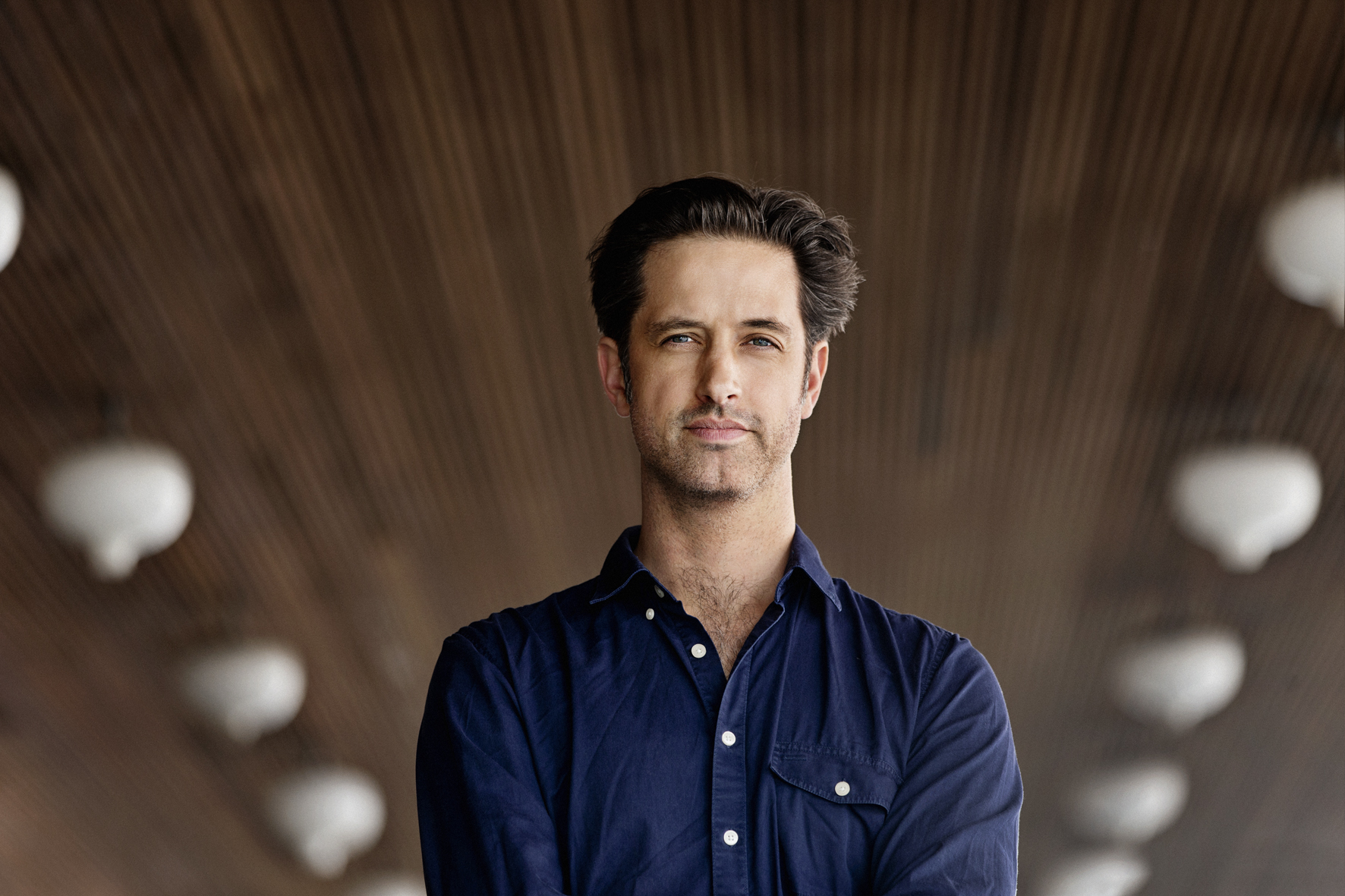
Simon Steen-Andersen, photo by Lars Svankjær
Another five events and premieres over two evenings will be featured at the Warsaw Autumn Club curated by Dagna Sadkowska, with performers including DJ Lenar (live electronics) and Dries Tack (winds) in Alexander Chernyshkov’s piece breathin every now and then; the Stockholm Saxophone Quartet in Dror Feiler’s work Anvil and Parachutes; the Surreal Voyagers duo of Aleksander Wnuk and Michał Lazar; and Tony Buck and Magda Mayas in Mycelium.
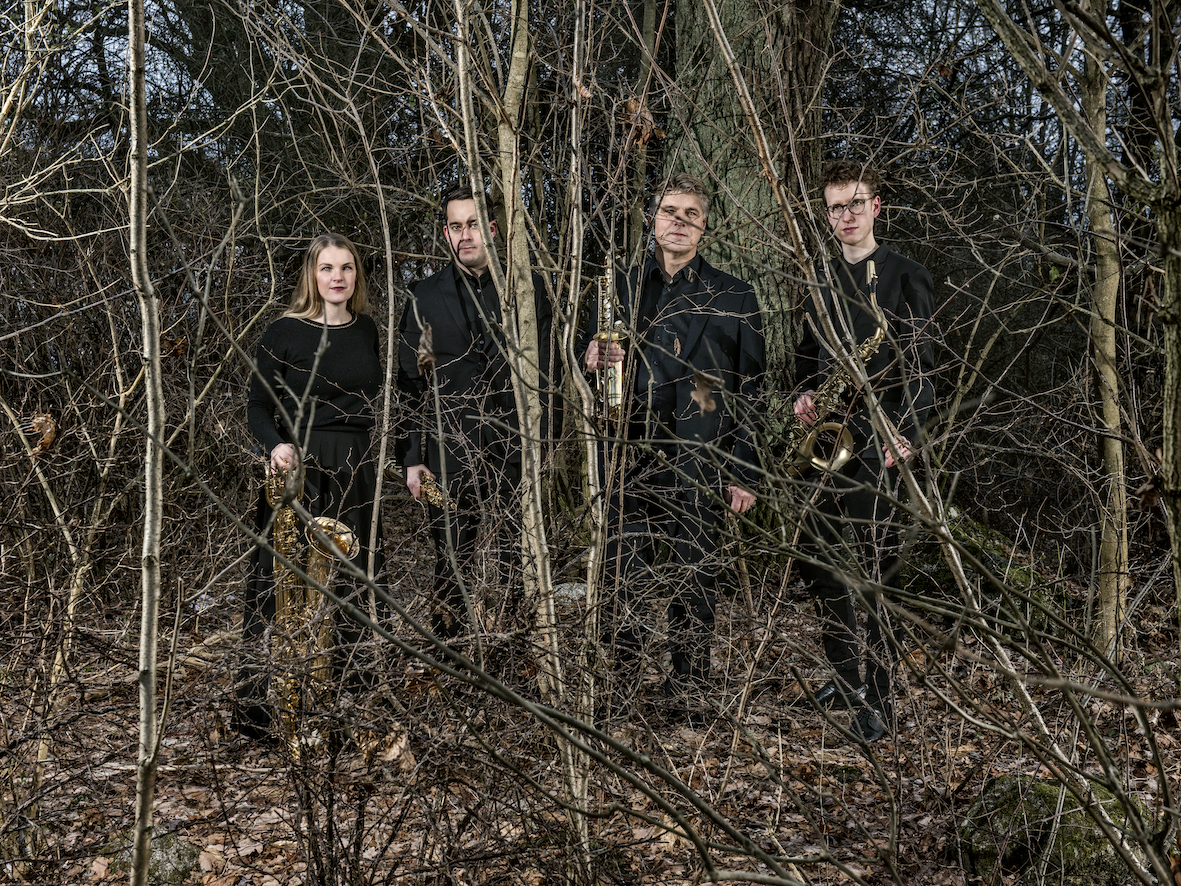 Stockholms Saxofonkvartett, photo by Johan Bergmark
Stockholms Saxofonkvartett, photo by Johan Bergmark
This year’s Little Autumn has become big. While in its infancy it offered six to eight events per year, this year’s fourteenth edition features as many as twenty-four events, thirteen of which are actively coproduced by children and young people. This is also its idea and aim: to actively and repeatedly involve children in creative and cocreative activities related to contemporary music. Thanks to the active presence of children and young people, we can proudly say that this year’s Little Warsaw Autumn is cocreated by around three hundred artists and artists young and old (including about two hundred children). What is also unique about this edition is that, without exception, all the Little Warsaw Autumn presentations are world premieres, no fewer than fourteen of them (exactly as many editions as our “Little” festival of contemporary music to date). The curator of the Little Warsaw Autumn is Anna Kierkosz.
Warsaw Autumn’s fringe events this year include:
– Playground – call for collaborations, a concert performed by Spółdzielnia Muzyczna / Music Cooperative, with works by Rafał Ryterski (Birdsongs), Lautaro Figueroa Balcarce and Ian Mikyski, and Ilona Perger (Mycelia for ensemble, video and tape).
– A concert by Sinfonietta Cracovia conducted by Lilianna Krych with works by Linda Catlin Smith (Les fleurs anciennes for thirteen string instruments), Tine Surel Lange (Ritual for Changing Times – Spring Equinox for strings and video), Agata Zemla (what field whispers for strings and live electronics), and Katarina Gryvul (Uhtceare for voice, fourteen strings and electronics). This event is curated by Krzysztof Pietraszewski.
The Warsaw Autumn Internet Radio hosted by Monika Pasiecznik and Tomasz Biernacki will broadcast reports, cultural reflections, and conversations with guests. Artists and performers will also be interviewed during meetings at the Austrian Cultural Forum and the Fryderyk Chopin University of Music. The young generation of composers will also have the opportunity to consult with outstanding artists during workshops at the Austrian Cultural Forum.
Let me stress that several key events have had to be postponed. Not much has changed in the essential regulations of the non-governmental sector in Poland over the last fifteen years. The scope of possible action is narrowing, regardless of the size of the initiative. I write this out of concern for cultural content rather than the standards of artistic production, although there is nothing wrong with concern for the quality of artists’ work. It is time for a reset, for a new contract for culture. Let this paragraph be yet another example of the permeations between the language of music and the space in which it is immersed.
Much, however, has been done—largely thanks to networking, joining together in organising with other entities from Poland and abroad. We would like to thank those funding entities that did what they could to make Warsaw Autumn programmatically relevant: the Ministry of Culture and National Heritage, the City of Warsaw, National Centre for Culture, Adam Mickiewicz Institute, Fryderyk Chopin University of Music, Creative Products Development Centre, Society of Authors ZAiKS, STOART Performers’ Union, Warsaw Philharmonic, Polish National Radio Symphony Orchestra in Katowice, Basel Sinfonietta, German Music Council, Polish Radio, Polish Music Publishers, National Institute of Music and Dance, Austrian Cultural Forum, French Institute in Poland, Embassy of the Kingdom of the Netherlands in Warsaw, Orkest De Ereprijs, Ulysses Festival Network, Gaudeamus Music Week, Avant Art Festival, Eugeniusz Geppert Academy of Fine Arts in Wrocław, Random Check group, Spółdzielnia Muzyczna / Music Cooperative, the team of Maria Pomianowska and the Ernst von Siemens Music Foundation, Guliwer Puppet Theatre, Warsaw Chamber Opera, TR Warszawa Theatre, National Ethnographic Museum in Warsaw, Żoliborz Cultural Centre, Pardon To Tu, and the Hashtag Lab – Contemporary Music Space.
This year’s Warsaw Autumn is dedicated, on the centenary of his birth, to the memory of Andrzej Markowski: conductor, composer, organiser of many festivals and institutions, artist and man of many talents and activities, who contributed to Warsaw Autumn over several decades, leading numerous performances, including premieres of works that firmly belong to the legend of the Festival and the history of new music.
Jerzy Kornowicz
Director of the Festival
Autumnal variety...
As usual under the direction of Jerzy Kornowicz, the 2024 edition of Warsaw Autumn has a clear message and goal. It appears that variety is to be the most characteristic feature of this year’s festival. “At Warsaw Autumn, we show the musical state of things as a dynamic process, an overlapping of phenomena, a map of shape-shifting fronts, as opposed to the static, monadic, ceremonial notions of some linguistic idioms and the exclusion of others. Let us delight in this dynamism, for there is so much life, colour, emotion, and structural order in it. I will perhaps extinguish the ecumenic spirit when adding that openness to the richness is one thing, but structure, consistency and coherence or even radicalism in using the above-mentioned criteria is another—the latter is necessary for the Festival to have its own character” writes Jerzy Kornowicz on adjacent pages. I understand that the director of the Festival, with all his enthusiasm for the diversity of the modern musical phenomena and his recognition of their artistic potential, sees the necessity of controlling this timbral wildness, so that it does not morph into chaos.
Music without construction, consistency and coherence—I do not quite see radicalism in this group—ceases to be music. Some chaotic sound phenomena might event turn out to be interesting, but will they be a work of art? Let us separate the wheat from the chaff and look for beauty. I can already hear the indignation that it is not about beauty, and then what is beauty anyway— an archaic or even parochial notion. Yes, I am being a little provocative, but there will be an opportunity to reflect on all this at the concerts of this year’s Warsaw Autumn—and then the aim of the Festival’s director, to provoke thinking, and not to give some aesthetic pleasure—will be achieved.
So diversity yes, but the Festival’s top ticket will anyway be Paweł Szymański’s it’s fine, isn’t it?, censored by our previous government. What did they even think? Now it is allowed.
And I also wish you great aesthetic experiences
Mieczysław Kominek
President of the Polish Composers’ Union
Warsaw Autumn for Andrzej
Markowski, on the centenary
of his birth
Lublin, 22 August 1924—Warsaw, 30 October 1986
Nothing that is music is alien to me. I live it. Even in the humblest song or ballad, if it is alive, true, I find my life, my truth. ... I am an enemy of very narrow specialisation. I personally would not fit in. If someone promised me large sums of money for focusing on this and not that branch of music, it would be a death sentence for me.
He was a comprehensive musician. Krzysztof Penderecki issued the following reference for Markowski:
To whom it may concern
Sirs:
I have the pleasure in strongly recommending Mr. Andrzej MARKOWSKI for appointment as conductor and teacher. I know him since 1957 when he became the first performer of many of my scores. He is also responsible, as one among very few other people, for the incredible, fantastic outburst of the Polish contemporary music in the sixties and belongs to the creators of the “Polish school of modern music.” He devoted all his strengths, abilities, and zeal to the stimulation and boos of twentieth-century music.
Mr. Markowski is a musician of the highest rank and both in teaching and conducting has always shown outstanding qualities. His contribution to the development of musical life in Poland, with the emphasis laid on modern music, was a major one.
I have no doubt that his abilities and his intellectual independence are an asset to any artistic and teaching programme. I believe that the professional qualifications of Mr Markowski combined with his personal qualities can guarantee the full success in his future activities and entitle me to support his application for a teaching or conducting position everywhere.
Yours very sincerely,
Prof. Dr Krzysztof Penderecki
His musical interests spread from cantata-oratorio music of the Baroque and music of the twentieth century. Independently of his more or less permanent functions as a conductor in many Polish philharmonics, he undertook initiatives linked to Baroque and contemporary music. In 1959, he established a chamber orchestra in Cracow with a view to performing new music, and went on to organise a series of concerts entitled Musica Antiqua et Nova and the Cracow Spring of Young Musicians festival, where he premiered works notably by Juliusz Łuciuk, Tadeusz Machl, and Grażyna Bacewicz. In Wrocław, he established Poland’s largest music festival after Warsaw Autumn: the Wratislavia Cantans oratorio-cantata festival, serving as its director in the years 1966–76. He was also director of the Festival of Polish Contemporary Music in Wrocław and the Festival of Organ and Harpsichord Music.
He presented Polish and international contemporary music at Polish and international venues. He was strongly associated with the Warsaw Autumn Festival. In 1971–81 he served on its repertoire committee. He gave numerous world premieres of works by Polish composers, including Tadeusz Baird, Augustyn Bloch, Augustyn Bloch, Zbigniew Bujarski, Andrzej Dobrowolski, Henryk Mikołaj Górecki, Wojciech Kilar, Roman Palester, Krzysztof Penderecki, Kazimierz Serocki, Kazimierz Sikorski, Tomasz Sikorski, Bogusław Schaeffer, Bolesław Szabelski, Witold Szalonek, Paweł Szymański, as well as foreign composers such as Pierre Boulez, Cornelius Cardew, Edison Denisov, Hans Werner Henze, Charles Ives, György Ligeti, Bruno Maderna, Olivier Messiaen, Arnold Schoenberg, Karlheinz Stockhausen, Igor Stravinsky, John Tavener, Edgard Varèse, Anton Webern, and Iannis Xenakis. His recording of Krzysztof Penderecki’s Utrenja received the prestigious French Grand Prix du Disque in 1974. From the second Warsaw Autumn in 1958 to 1983, Andrzej Markowski conducted 124 works. He became a permanent fixture in the Festival’s history, and Polish contemporary music had a persistent advocate in him.
Mieczysław Kominek
President of the Polish Composers’ Union
The programme is subject to change.